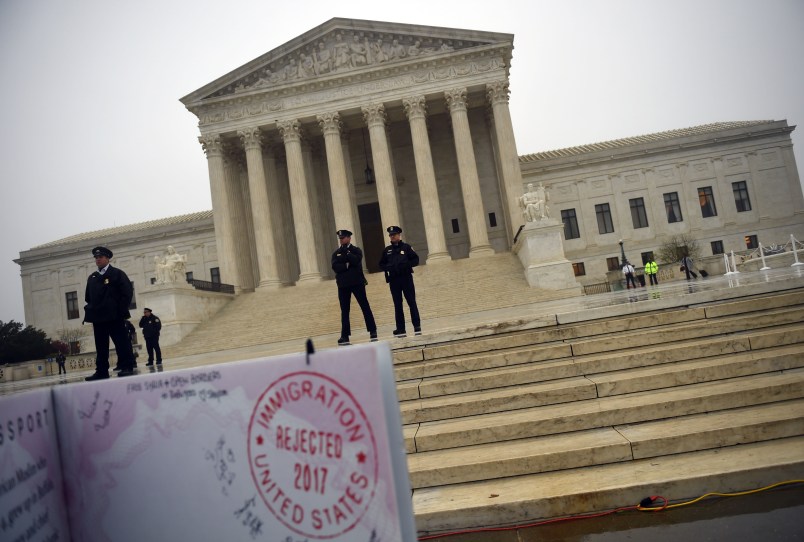WASHINGTON, D.C. — Early in the oral arguments Wednesday morning over the constitutionality of President Donald Trump’s travel ban, the Supreme Court’s more progressive justices grilled Solicitor General Noel Francisco about how much they should take Trump’s anti-Muslim tweets and campaign statements into account in determining whether the executive order was motivated by true national security concerns or by racial animus.
Specifically, Justice Elena Kagan asked Francisco to imagine an “out-of-the-box” President who campaigned as a “vehement anti-Semite,” and continued stoking a “hatred of Jews” during his time in office, who directs his staff to write a proclamation banning immigration from Israel.
Francisco replied that if that president’s cabinet came to him with legitimate national security reasons to ban Israelis from entering the United States, he would legally be allowed to do so, “even if in his private heart-of-hearts he harbors animus.”
He quickly added that Trump’s executive order — currently in its third iteration after lower federal courts put the first two versions on hold over these very concerns — is nothing like that hypothetical, noting that the travel ban was the product of “a neutral baseline applied to every country in the world.”
Minutes later, Justice Sonia Sotomayor said she wanted to return to “something that’s been bothering me,” and again presented Francisco with the hypothetical anti-Semitic President.
“The President is the head of the Executive Branch, and can hire and fire anyone he wants, and create the policies he wants. So if he says, ‘I want to keep out the Jews, period,’ why wouldn’t the actions of his cabinet not be subject to suspicion and review?” Even if the cabinet goes through a legitimate process in creating the ban, she explained, “they were basically told what the outcome of their deliberations should be.”
Francisco replied that cabinet members are sworn to uphold the Constitution, and he’s confident they would refuse to carry out such a blatantly unconstitutional order from that imaginary president and would instead resign.
“That’s the check” on the President’s power, he asserted, before again insisting that under Trump, “you don’t have anything like that.”
Kagan disagreed, asking Francisco if in fact Trump’s anti-Muslim rhetoric on the campaign trail and since taking office is “exactly that.”
Francisco argued that campaign statements should not be considered at all, since they came from a “private citizen” who has not yet undergone the “fundamental transformation” of the oath of office.
Justice Anthony Kennedy, usually considered the swing vote between the Court’s liberal and conservative wings, appeared skeptical, asking if campaign statements are still “irrelevant” if the President acts on them “on day two” — a possible reference to the Trump administration’s first travel ban, which was enacted just days after his inauguration. Other Justices pressed the Solicitor General on the question, asking if campaign statements count if the candidate in question is already holding elected office, such as a small-town mayor running for Congress.
During his turn at the podium, the attorney challenging the travel ban on behalf of the state of Hawaii argued that even if Trump’s campaign promise of “a total and complete shutdown” of Muslim immigration is not admissible in court, his and his staff’s words and actions since he took office clearly reveal a discriminatory motive.
Neal Katyal specifically cited Trump’s decision last November to share multiple anti-Muslim propaganda videos with his millions of Twitter followers, and his press secretary’s decision to defend those tweets and connect them to the administration’s policy goals.
“Look, I think what he’s done is elevate the conversation to talk about a real issue and a real threat, and that’s extreme violence and extreme terrorism,” Sarah Huckabee Sanders told reporters, “something that we know to be very real and something the President feels strongly about talking about and bringing up, making sure it’s an issue every single day, that we’re looking at the best ways to protect Americans.”
When asked by Justice Sotomayor about the government’s claim that the third executive order had gone through a legal “cleansing” — the multi-agency review that added some countries to the ban list and dropped others — Katyal replied that the Executive Order is still “tainted” not only by the President’s rhetoric, but because the text of the third travel ban notes it is based on the first two versions that ran into trouble in federal court.







Did they use charcoal or a propane grill? Or perhaps they strapped Francisco to the front end of a 1938 Buick Roadmaster in-line 8.
Francisco, btw would replace Rosenstein if Trump fired him.
Francisco replied that cabinet members are sworn to uphold the Constitution, and he’s confident they would refuse to carry out such a blatantly unconstitutional order from that imaginary president and would instead resign.
Yea that’s been happening…
THERE WAS NO PIVOT, you nasty man!!! Trump is the same as he ever was. He hasn’t been changed by his oath of office, but he certainly has changed the office for the worse.
Well played.
The reality is that our system is not set up to cope with an “out of the box” president. Those questions provide a basis to toss the ban for precisely that reason: that the authority Congress thought it was giving to the president never contemplated something like this.
Too bad the “strict constructionists” won’t buy it.
Watch out – if Kagan and Sotomayor end up in the majority on this, Trump is gonna TWEET.